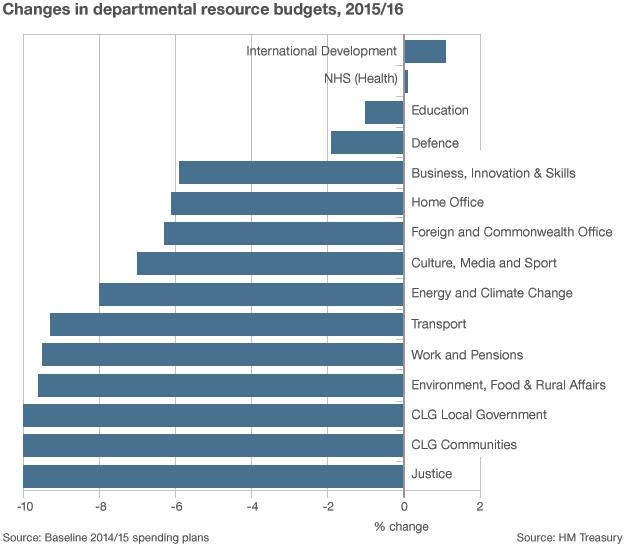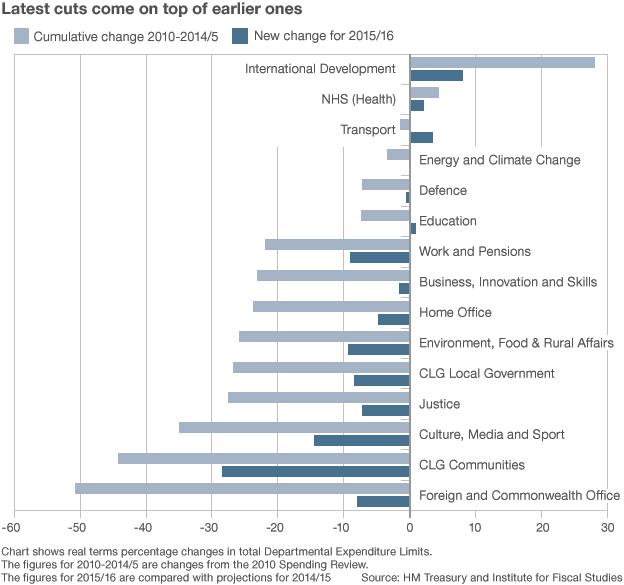Spending Review: Public sector to lose automatic rises in pay
- Published
- comments
Andrew Neil has the headline announcements from George Osborne's Spending Review
Millions of public sector workers face losing automatic annual pay increases as part of an £11.5bn cuts package unveiled by Chancellor George Osborne.
He also announced a cap on total welfare spending and axed winter fuel payments for expatriate pensioners in hot countries from 2015.
Welfare changes mean most unemployed people will have to visit a JobCentre every week instead of fortnightly.
The cuts package will cover a single financial year - 2015-16.
It was forced on the chancellor by slower than expected economic growth and deficit reduction, but he insisted the economy was on the right track, telling MPs: "Britain is moving out of intensive care and moving from rescue to recovery."
But shadow chancellor Ed Balls, for Labour, said the new round of cuts represented a "comprehensive failure" of Mr Osborne's economic strategy.
Other key announcements from the chancellor's statement include:
Total annual spending on welfare, including housing benefit, disability benefit, tax credits and pensioner benefits - but excluding the state pension - will be capped for the first time, from April 2015
Local government will take the biggest hit, with cuts at the Department for Communities and Local Government of 10%
The Home Office must save 6% from its budget, but the police budget will be cut by a lower 4.9% and counter-terror policing will be spared
The culture department escapes the worst of the cuts with expected savings of 7%
Science and research funding will remain flat
The NHS, schools in England and foreign aid will continue to be protected from budget cuts
The security services were the biggest winners, with a 3.4% boost to funding and Mr Osborne praising their "heroic" efforts to "protect us and our way of life"
Mr Osborne said the cuts, which will kick in just before the next general election, would ensure Britain "lives within its means", but they would be guided by fairness, economic growth and reform.
Public sector pay rises are frozen at 1% until 2015-16 but Mr Osborne is to scrap so-called progression pay, where civil servants automatically move up through pay grades.
In addition, the Treasury says "substantial reforms" to progression pay will be taken forward, or are already under way, for teachers, the health service, prisons and the police, "ensuring that public sector workers do not receive pay increases purely as a result of time in post".
The armed forces will be excluded from the changes.
Mr Osborne told MPs: "Progression pay can at best be described as antiquated; at worst, it's deeply unfair to other parts of the public sector who don't get it, and to the private sector who have to pay for it."
And he announced a tougher regime for jobseekers, saying they will have to visit a JobCentre every week to spend more time with advisers. There will also be a seven-day wait before people can initially claim benefits.
"Those first few days should be spent looking for work, not looking to sign on," said Mr Osborne.
"We're doing these things because we know they help people stay off benefits and help those on benefits get back into work faster."
In a further change, claimants who cannot speak English "will have to attend language courses until they do".
Frozen grants
The "temperature test" for winter fuel allowance will apply to expatriate pensioners living in Portugal, Spain, Greece, France, Gibraltar and Cyprus.
With health, education and aid ring-fenced, all other departments will have to take a bigger hit - average budget cuts for 2015-16 of between 8% and 10%.
The Department for Communities and Local Government, the Treasury and the Department for Environment, Food and Rural Affairs were among the hardest hit, with 10% budget cuts.
Vince Cable's Department for Business, Innovation & Skills, the last to reach a deal with Mr Osborne after tough negotiations, got off relatively lightly with cuts of 6% and a commitment to keep money for more apprenticeships, but student grants will be frozen.
The Ministry of Defence will face further cuts to its civilian workforce as its budget was maintained in cash terms at £24bn - representing a real-terms cut.
The Department for Transport will be forced to make savings of 9% in day-to-day spending, but will get the largest boost of any department in its capital spending, which rises to £9.5bn in 2015-16.
Mr Osborne also said the government would spend £2m to "look at the case for" a £12bn Crossrail 2 project in London, which is backed by London Mayor Boris Johnson, and announced £3bn more for affordable housing in 2015. Further details of capital spending plans are expected on Thursday.
Capital spending is down in real terms but is falling at a slower rate than forecast by the previous Labour government, Treasury sources insist.
The chancellor announced that the council tax freeze, due to come to an end next April, would be extended for the next two years. He said that would mean nearly £100 off the average council tax bill for families.
But he warned of 144,000 further public sector job cuts and said local councils would have to make "the kind of sacrifices central government is making".
Sir Merrick Cockell, chairman of the Local Government Association, said further cuts would "stretch essential services to breaking point in many areas".
But he welcomed a plan by Mr Osborne to transfer £2bn from the NHS budget to fund social care, which has been badly hit by council cuts in some areas.
'Out-of-touch chancellor'
Labour has said it will not reverse the spending cuts announced for 2015-16, although it will borrow money to invest in building more houses.
Mr Balls launched a fierce Commons attack on the "out-of-touch chancellor" who, he said, had "failed on living standards, growth and the deficit, and families and businesses are paying the price for his failure".
"If the chancellor continues with his failing economic plan, then it will fall to the next Labour government to turn the economy round and to take the tough decisions to get the deficit down in a fair way," added Mr Balls.
But he struck a more cautious note in a later interview with the BBC, saying he backed English language tests for migrants and would "look at the detail" of the benefit changes, adding: "If it saves money and it works, fine."
He also pledged to study the pay progression proposals to see if it would work out cheaper than performance-related pay, which will be replacing it.
The trade unions reacted angrily to the public sector pay squeeze. Prospect, which represents 34,000 specialist civil servants, said the Spending Review was a "kick in the teeth" for its members.
Deputy general secretary Leslie Manasseh said: "The chancellor obviously isn't aware that his government have scrapped progression for most civil servants already, apart from where it is part of an employee's contractual rights.
"Our members have already put up with two years of pay freezes followed by pay caps alongside pension contribution increases of over 3%. Many members have seen the real value of their pay plummet by up to 15%."
But business lobby group the CBI said the squeeze was "tough but necessary" at a time of tight public finances and it was also "encouraging to see that government will have greater control of the welfare budget through the new cap".

